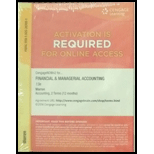
A.
Identify and explain the five elements of internal control.
A.
Explanation of Solution
Internal Control: Internal control refers to the policies, and plans of the business organization along with other measures with a view to safeguard its assets, encourage the employees to adhere to the plans, to improve on the operational efficiency, and to ensure correct and reliable accounting information. Internal control is a process which ensures continuous reliability of accomplishment of a company’s objectives, related to operations, financial reporting, and in conformity with laws and regulations.
Five elements of internal control:
- Control Environment: Control Environment refers to the attitude of top brass of the company or the corporate culture. The top brass of the company must set the tone to improve the morale for rest of the employees of the business.
- Risk assessment: The business must be able identify the risk associated with it, and accordingly use the internal control to safeguard its assets and ensures fairness in presentation in accounting information.
- Control procedures: The objective of setting the control procedure is to ensure that the business achieves its objectives.
- Monitoring controls: The internal control used in the business is being monitored by the internal auditors who are hired by the business, to ensure that the employees are adhering to the policies of the business and running the operations efficiently. The external auditors on the other hand ensures that the business accounting records are being maintained in accordance with the Generally Accepted Accounting Principles (GAAP).
- Information and communication: Information and communication system is important for a business and hence only authorized persons should be allowed the access to the confidential accounting information. Approvals are also should be made mandatory for the transactions by the
control system.
B.
Explain the importance of internal control.
B.
Explanation of Solution
When the elements of internal control are considered, one element of internal control is not important than other. In order to have an effective internal control, all five elements are considered to be necessary.
Want to see more full solutions like this?
Chapter 7 Solutions
CengageNOWv2, 2 terms Printed Access Card for Warren?s Financial & Managerial Accounting, 13th, 13th Edition
- Solve this Accounting Problemarrow_forwardThe equipment was sold for $60,000 The equipment was originally purchased for $33,000. At the time of the sale, the equipment had accumulated depreciation of$30,000. Calculate the gain or loss to be recorded on the sale of equipment.arrow_forwardCan you solve this general accounting problem with appropriate steps and explanations?arrow_forward
 Cornerstones of Financial AccountingAccountingISBN:9781337690881Author:Jay Rich, Jeff JonesPublisher:Cengage LearningPrinciples of Accounting Volume 1AccountingISBN:9781947172685Author:OpenStaxPublisher:OpenStax College
Cornerstones of Financial AccountingAccountingISBN:9781337690881Author:Jay Rich, Jeff JonesPublisher:Cengage LearningPrinciples of Accounting Volume 1AccountingISBN:9781947172685Author:OpenStaxPublisher:OpenStax College Auditing: A Risk Based-Approach (MindTap Course L...AccountingISBN:9781337619455Author:Karla M Johnstone, Audrey A. Gramling, Larry E. RittenbergPublisher:Cengage Learning
Auditing: A Risk Based-Approach (MindTap Course L...AccountingISBN:9781337619455Author:Karla M Johnstone, Audrey A. Gramling, Larry E. RittenbergPublisher:Cengage Learning


